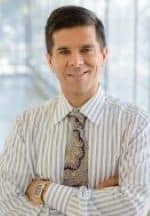 This month the PNA Spotlight focuses on Dr. Manish K. Aghi. Dr. Aghi is a neurosurgeon specializing in brain tumors at UCSF Medical Center. He cares for adult patients with a wide range of conditions, including astrocytomas and anaplastic astrocytomas, oligodendrogliomas, glioblastomas, meningiomas and pituitary adenomas. As principal investigator at the UCSF Brain Tumor Research Center, his interests include glioblastoma angiogenesis, mechanisms of glioblastoma resistance to anti-angiogenic therapy and experimental glioblastoma therapies such as cancer-killing viruses.
This month the PNA Spotlight focuses on Dr. Manish K. Aghi. Dr. Aghi is a neurosurgeon specializing in brain tumors at UCSF Medical Center. He cares for adult patients with a wide range of conditions, including astrocytomas and anaplastic astrocytomas, oligodendrogliomas, glioblastomas, meningiomas and pituitary adenomas. As principal investigator at the UCSF Brain Tumor Research Center, his interests include glioblastoma angiogenesis, mechanisms of glioblastoma resistance to anti-angiogenic therapy and experimental glioblastoma therapies such as cancer-killing viruses.
Professor Aghi earned his medical degree and a doctoral degree in neurosciences from Harvard Medical School. He completed a residency in neurosurgery at Massachusetts General Hospital. He is a member of the Society for Neuro-Oncology, American Association of Neurological Surgeons, Congress of Neurological Surgeons and Pituitary Network Association. Among his honors are the Preuss and Mahaley awards from the American Association of Neurological Surgeons, and the Ronald L. Bittner Award, Synthes Skull Base Award and Integra Foundation Award from the Congress of Neurological Surgeons.
Dr. Aghi was kind enough to answer some questions from the PNA. His answers follow. (Note: This is a re-print from Dec. 2021)
• What inspired you to choose your career path?
I was drawn to a career as a pituitary neurosurgeon-scientist because it represents the perfect overlap between the areas of medicine that I am most passionate about. As a medical student at Harvard, I was always fascinated by the regulatory circuits of endocrinology and how their disturbance by pituitary tumors and pituitary disorders so dramatically affects people’s quality of life, disrupting such basic functions as their vision, day-to-day energy, weight, mood, and reproductive function. I was also drawn to neurosurgery, a field in which technology has advanced so rapidly that we are able to provide minimally invasive access to the center of the skull base for safe resection of pituitary tumors with minimal risk and rapid patient recovery.
• What is the primary focus of your work/research?
I am a neurosurgeon-scientist at University of California San Francisco (UCSF) specializing in pituitary tumors at the California Center for Pituitary Disorders at UCSF. As a neurosurgeon directing the Center for Minimally Invasive Skull Base Surgery at UCSF, I perform over 100 endoscopic endonasal procedures for pituitary tumors each year. I am also a scientist running a lab in the UCSF Diller Cancer Research Building, where I have had NIH and industry funding for over a decade to study the mechanisms by which brain tumors like pituitary tumors form and grow and use these insights to define novel therapies for these tumors
• What do you consider to be the future of your field?
The future of my field will be defined by the significant advances we are making in our understanding of the biology of pituitary tumors. These insights will give rise to meaningful benefits for our patients, including new molecular classifications of pituitary tumors that will help clinicians better predict the natural history and therapeutic responsiveness of these tumors and targeted therapies that will offer non-surgical options for some patients.
• What should patients know about your field/what deserves more recognition/awareness?
Patients need to know how important multi-disciplinary care is for pituitary disorders. During a visit to our center, patients will usually be seen not only by me, but by an endocrinologist and other pertinent specialists relevant to their condition such as ENT, radiation oncology, or ophthalmology. This ensures that they are receiving the best possible care with decision making made by the consensus opinions of multiple specialists following evidence-based guidelines
• What would you like to convey about yourself to your patients?
I would like to convey to my patients how committed I am to their well-being. When I am not seeing them in clinic or with them in the operating room, I am constantly reviewing their imaging and hitting refresh on the electronic medical record to get their lab results as soon as they become available, sharing their hopes for durable biochemical remission and preservation of hormonal function. And while I am a neurosurgeon, I am a doctor first and recognize that surgery is a tool that must be reserved for cases that will benefit from surgery, as many incidentally-found small tumors have a benign natural history that will be unlikely to harm the patient during their lifetime, making observation through serial imaging the recommended course of action instead of surgery for these particular patients.
• Why did you get involved with the PNA; what is the extent of your involvement?
I joined the PNA over a decade ago because the PNA has been very impactful in making the small number of high-volume pituitary specialists throughout the country available as an educational resource for patients, no matter where the patients are located. I have enjoyed meeting patients from all over the U.S. and the world after numerous PNA webinars and answering their questions, as it allows me to help patients from beyond my geographical area.
